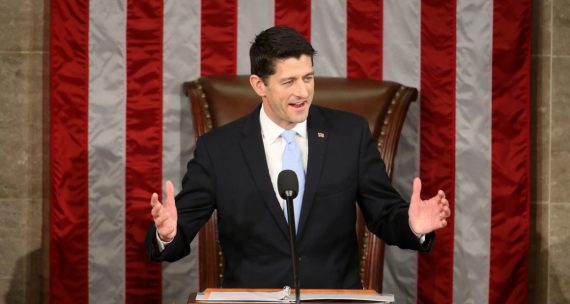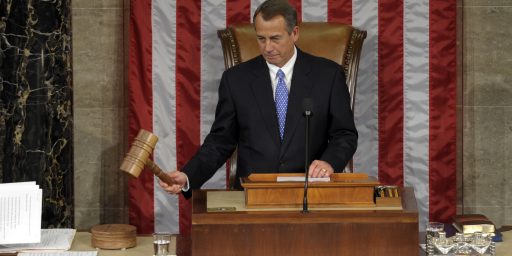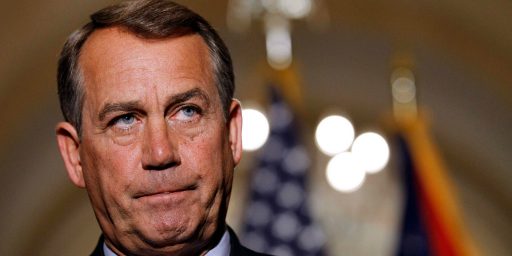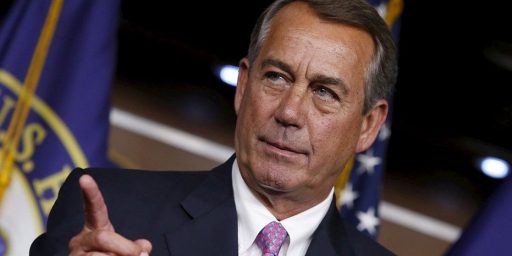The End Of Paul Ryan’s Honeymoon?
Five months after becoming Speaker of the House, Paul Ryan seems to be running into some of the same difficulties that John Boehner did.
After five months of relatively smooth sailing, it appears the honeymoon may be over for Speaker of the House Paul Ryan:
When Rep. Paul D. Ryan (R-Wis.) took over as House speaker, it was supposed to signal a new era for Republicans — the arrival of a younger, more conservative visionary, who scrubbed the cigarette smoke stains from outgoing Speaker John A. Boehner’s Capitol office, and promised a fresh start.
Republicans craved the upbeat, button-down image Ryan offered. And his team served up the Ryan brand with marketing flourish — lofty speeches, a TV blitz and videos galore, including a cheeky snow-cam from the speaker’s balcony showing the winter blizzard over the National Mall.
But five months in, Ryan finds himself with a familiar problem. As Congress is careening toward another budget crisis and the Republican Party is ripping itself apart over Donald Trump’s rise, the man best known as the architect of the GOP’s austere spending blueprint is likely to miss an April 15 deadline to approve a new funding plan for 2017.
He’s been unable to overcome the same resistance from the conservative House Freedom Caucus that doomed his predecessor, and is so far similarly unwilling to use the power of the speaker’s office to force stragglers to fall into line.
On the top issue of the day, the turbulent presidential race, Ryan has refused to wade into the muck, fearful of alienating House Republicans who back Donald Trump, but also worried about tarnishing his own image in case the party needs his help at a brokered convention in July.
To some, Ryan’s repeated calls for Republicans to “raise our gaze” and his frequent attempts to position himself as the GOP’s deep thinker are starting to give off an air of ivory tower insignificance. Conservatives wonder if he’s still a “young gun” trying to shake up the party.
At a Trump rally in Ryan’s Wisconsin hometown of Janesville last week, the crowd booed the mention of his name.
“Now we understand why he didn’t want the job: Congress is broken and it’s hard for anybody to fix it,” said John Feehery, a former Republican aide and now a GOP strategist. “Jumping on the back of this tiger has not been easy.”
Allies see Ryan, who declined to be interviewed for this story, as a leader who is slowly and deliberately piecing back together a Republican Party that appears to have imploded during President Obama’s years in the White House.
In many ways, the speaker’s problems are of his own making, the result of a leadership strategy he helped forge to recruit the most conservative candidates to run for office and then, after Republicans won the House majority in the 2010 midterm election, reject almost all of Obama’s initiatives.
“It’s led to all this anger,” said Norman J. Ornstein, a scholar at the American Enterprise Institute. “They tried to make this entire process look ugly and illegitimate. It worked. In the process of winning these short-term victories in the midterms, they laid the groundwork for Trump.”
Now, some of the same Freedom Caucus lawmakers who forced Boehner’s early retirement are bearing down on Ryan.
Many are scoffing at the higher government funding levels Boehner had accepted as part of a compromise with Democrats last year. That deal was supposed to “clear the barn” for Ryan by reversing some of the automatic “sequester” cuts that factions of both parties said were too severe. But many Republicans who didn’t like the deal then don’t like it any better now, and Ryan doesn’t have enough votes to pass the budget without them.
Without an approved budget, it will be harder for Congress to pass the annual appropriation bills needed to fund government services. Ryan can’t rely on Democrats, as Boehner did, because the proposed budget contains Republican priorities, like a Medicare overhaul with a new voucher program, that Democrats oppose.
Ryan initially escaped blame from conservatives for the deal Boehner made, but the honeymoon is now over and Congress risks a government shutdown if new money is not approved by Oct. 1.
“Victory would be not shutting down the government,” said Ron Bonjean, a former House Republican leadership aide who is now a strategist.
Some in the Freedom Caucus appreciate Ryan’s willingness to work with them, but see little change in the outcome. “Paul was part of the Boehner entourage,” said Rep. Paul Gosar (R-Ariz.), a Freedom Caucus member.
To a large degree, of course, Ryan’s initial months in office have gone well largely because it was set up that way for him, apparently at his insistence. Before Ryan was sworn into office, the House signed off on a spending bill that covered the remainder of the current Fiscal Year, raised the debt ceiling in a manner that guaranteed that it would not be an issue until after the new Congress takes office in January, and passed several other pieces of legislation that had been sitting in the hopper for some time. The only job that remained for Congress after Ryan took office was to pass the individual spending bills for each branch of government and Ryan was able to use the honeymoon period to get those measures passed relatively easily. Now, though, the House must turn its attention to passing a spending bill for the fiscal year that ends in September and, thanks to the combination of election year politics and the fact that the so-called ‘House Freedom Caucus’ didn’t really change when Ryan took office, it would appear that Ryan may face some of the same fights that John Boehner did during his time in office.
None of this is to say that things will end up the same for Ryan as they did for Boehner, of course. For one thing, Ryan still seems to have far more goodwill with the conservative win of the House GOP Caucus than Boehner ever did so it’s likely that he’ll be able to maintain some control over his members and get the measures passed that need to be passed. Boehner never really had that kind of relationship with the conservatives, and it was a large part of the reason why they were so quick to rebel against him so often. With Ryan, they’re dealing with someone that in many ways was one of them not very long ago and who they openly embraced as an intellectual leader from the time he took over the House Budget Committee in 2011. Additionally, the fact that we’re in an election year means that rebellion in the form of a refusal to pass a budget in September is unlikely both because of the damage it could theoretically do to the GOP heading into the election and because Members of Congress will be eager to return to their districts to begin the final stretch of campaigning before Election Day. As a worst prospect, this will mean that the House will likely at least pass a temporary spending bill that pushes finalizing the budget to the lame duck period in December. Nonetheless, it does appear that Ryan is finding that being Speaker is indeed the thankless task that he seems to have long suspected it would be. Unless the Freedom Caucus falls into line, which seems unlikely, it’s likely that things will just get more frustrating for Ryan as time goes on.







Karma’s a witch.
Democracy requires that the people see their government as legitimate and as representing their interests. Lincoln’s of, by, and for the people thing. The people need to see the government as us, not as them. That one of our Parties deliberately chose as an election strategy to paint the government as illegitimate, as the enemy, in order to, paradoxically, get control of that government, is hugely irresponsible. Republicans deserve every bad thing that may happen to them. But the rest of us didn’t do anything to deserve this.
Ryan never had any honeymoon with the Republican “base.” They hated his guts long before he assumed the speakership.
“Government is not the solution to our problem; government is the problem.” Ronald Reagan, 20 January 1981.
Thirty-five years of this steady drumbeat and here we are today.
My entire life (I’m 39) the GOP has been pandering to my neighbors here in the Deep South: older, uneducated, low-information, racist christians. They did so using dogwhistles and code words, so they could also attract educated and privileged white people who wanted more tax cuts.
Then limbaugh/fox/the internet came along and the head honchos couldn’t control the content anymore. The subtle messages and dog whistles are out, and now let’s build a wall and deport muslims and Black Privilege is the real problem etc etc.
How the GOP realigns is anybody’s guess.
It sure seems that some members of the so-called “Freedom Caucus” just can’t count votes.
The outcome is the same because Paul Ryan, like John Boehner, knows the obvious fact that nothing will come of Freedom Caucus demands until the numbers in the House change again.
I don’t know. Assuming the Freedom Caucus will be a bit better behaved because it’s an election year is like assuming Donald Trump won’t be misogynistic because he has to win a general. The evidence at hand does not back your assumption.
This is really comforting to me. Everyday I think “What if there is a terrorist attack between now and November, and we get a President Trump?”
Now we have a safety against that: the knowledge that with just a bit of nudging, the GOP will shut down the government 4 weeks before elections.
@Neil Hudelson: Things being how they are with this electorate and this year, I’m not sure I would count on your safety working as planned.
You know, it’s almost as if anyone could have seen this coming back when he was elected. Re-read some of the reporting done at the time, especially this bit from the Washington Post cited in the article above:
House Republicans were trying so hard to portray Ryan as a conservative messiah to unite the warring tribes and march out of the desert, and the political media bought it because these people are allegedly serious. So much of politics is crafting the image and selling it hard enough to convince yourself that reality will bend. Sanders has his pie-in-the-sky imagery of social democracy come to American shores, Clinton has her “I will get things done because I can get things done” tautologies, and Trump is just a walking postmodern wet dream. Best of all, these contenders aren’t anything close to the delusion running around Congress.
Ryan could still turn this around, but the illusion that the Freedom Caucus was going to bow to him was just that. If he turns it around, it won’t be due to a mastermind’s political maneuvering but more due to a craven attempt by Republicans to appear unified before the general. Watch, they’ll try to sell that myth too, and heavily, once their nominee is picked even if the convention center burns down in the process.
I tried saying something like this this morn, but the Spambot ate it:
How deep a thinker can Ryan be in such a shallow puddle?
Now I’ll see if it is still allowing me to comment
“Now that I’ve retired from active politics, I don’t mind that you [Rush Limbaugh] have become the Number One voice for conservatism in our Country.” Ronald Reagan, 11 December 1992.
Reagan led to Limbaugh and Limbaugh led to Trump.
jukeboxgrad:
You’re missing one of the linchpins: Gingrich
Grenade-chucking as Congressional tactic not just as talk radio sport. Inflammatory rhetoric mainstreamed onto The Hill.
I’d amend it to:
Reagan led to Limbaugh and Limbaugh led to Gingrich and Gingrich led to Trump.
—
And that’s just the tip of the iceberg. Below the waterline is The John Birch Society, Goldwater, George Wallace (a D, but nevertheless salient to the topic), Kevin Phillips / the Southern Strategy, and then later the Clinton impeachment (although arguably as perhaps a direct result of Gingrichism).
And don’t forget Orly Taitz.
In the short term, we have Trump 2016 because of Orly Taitz; Trump made his bones with this R base after he big-footed the Taitz / Arpaio birther investigation schtick. And he got his psychological motivation to actually run for President instead of just pretending to run to promote his personal brand after being being totally pwned at the 2011 White House Correspondents whatchamacallit dinner where Obama rhetorically spanked Trump repeatedly and soundly.
Birtherism gave 2011 Trump the means and the opportunity and the motivation to become 2016 Trump.
Trump stands on the shoulders of these folks. Maybe hiding behind the skirts of those folks.
In the long view, 1964 is the keystone year. Johnson vs. Wallace. Goldwater vs. Rockefeller. The ideological fire-starter: “I would remind you that extremism in the defense of liberty is no vice. And let me remind you also that moderation in the pursuit of justice is no virtue.” Civil Rights Act, Voting Rights Act, subsequent white flight to the Rs in the Old Confederacy..
It all hinges on 1964.
After 1964, the Ds lost the white voters in the Old Confederacy. Fairly swiftly. “I’d rather switch than fight.” LBJ was correct in his gloomy assessment of what the Great Society legislative success would do to the D’s electoral success in the future.
1964 changed everything in post-WW2 political America.
@de stijl:
I purposely edited out Lee Atwater and Frank Luntz from the above before I posted.
Arguably, they are surfers / riders on the zeitgeist rather than the shapers of it, but I could be easily nudged off this position. I could quite easily see them as prime factors in how the 2016 Republicans came to be who they are today rather than see them as a secondary influence.
I’m having qualms. The messengers sometimes have more impact than the actual candidates / principles.
Lee Atwater certainly had a longer and deeper effect on the Republican party than GHWB ever did. And Luntz’s framing tactics will have more impact on the 2016 race than will GWB’s Presidential legacy. GWB is already 95% down the R memory hole already and only to be revived if we have a 9/11 equivalent in the near future.
Good point about Newt and the others. He’s a little less famous than the players I mentioned, but he played a major destructive role.
@OzarkHillbilly:
Years ago Jack Kemp was routinely celebrated in the supposedly liberal MSM as the great intellectual of the Republican thought. I always took that as a slam on Republicans. Now Ryan plays that role (and I do mean role in the theatrical sense).
Krugman’s worn out keyboards pointing out that the arithmetic never works in Ryan’s brilliant proposals. But I guess it’s well known that arithmetic has a liberal bias.
jukeboxgrad:
Gingrich is the bridge that takes incendiary talk into congressional action.
Gingrich is weaponized Limbaugh.
@gVOR08:
What’s that maxim? In the land of the blind, the one-eyed man is king.
From an IQ perspective, Ryan is a 120 in a land of 100s who all think they’re 150s, so to them Ryan is a super-duper genius. To Darrel Issa, Ryan must seem a modern day wizardly mega-Einstein colossus bestriding the world smiting his foes with thought-lasers alone.